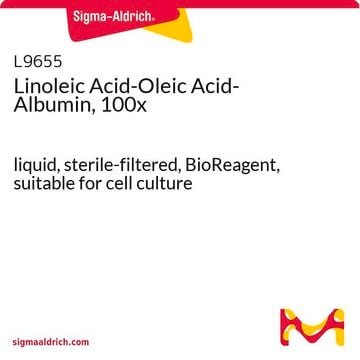O3008
Oleic Acid-Albumin from bovine serum
liquid, sterile-filtered, BioReagent, suitable for cell culture
Synonyme(s) :
Oleic acid-BSA complex
About This Item
Produits recommandés
Stérilité
sterile-filtered
Gamme de produits
BioReagent
Forme
liquid
Composition
Oleic acid, 2 mol/mol albumin
Concentration
100 mg/mL BSA in DPBS
90-120 mg/mL protein (biuret)
Technique(s)
cell culture | mammalian: suitable
Impuretés
endotoxin, tested
Température de stockage
2-8°C
Application
Actions biochimiques/physiologiques
Produit(s) apparenté(s)
Code de la classe de stockage
10 - Combustible liquids
Classe de danger pour l'eau (WGK)
WGK 3
Point d'éclair (°F)
Not applicable
Point d'éclair (°C)
Not applicable
Équipement de protection individuelle
Eyeshields, Gloves
Certificats d'analyse (COA)
Recherchez un Certificats d'analyse (COA) en saisissant le numéro de lot du produit. Les numéros de lot figurent sur l'étiquette du produit après les mots "Lot" ou "Batch".
Déjà en possession de ce produit ?
Retrouvez la documentation relative aux produits que vous avez récemment achetés dans la Bibliothèque de documents.
Les clients ont également consulté
Articles
Supplement cell culture systems with fatty acids for biomanufacturing heterologous proteins like monoclonal antibodies.
How the unsaturated fatty acid, oleic acid and other cell culture components affect the performance of serum-free, protein-free cell culture systems used for biomanufacturing heterologous proteins including monoclonal antibodies.
Notre équipe de scientifiques dispose d'une expérience dans tous les secteurs de la recherche, notamment en sciences de la vie, science des matériaux, synthèse chimique, chromatographie, analyse et dans de nombreux autres domaines..
Contacter notre Service technique







